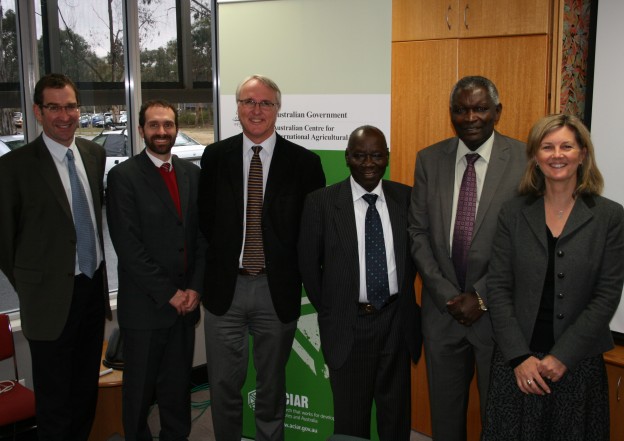Insights on South Sudanese agriculture from Professor Aggrey Abate, Vice Chancellor of the University of Juba
The AIFSC was delighted to host officials from Republic of South Sudan, Professor Aggrey Abate, Vice Chancellor of University of Juba and Dr Samson Paul Baba, Director General for Primary Health Care, Ministry of Health, who are visiting Australia to discuss agricultural and health issues with Australian government agencies (such as DFAT and AusAID) and academic colleagues. Professor Abate provided a very interesting presentation outlining the opportunities and challenges facing agriculture in South Sudan, a region with good potential that is dealing with the aftermath of two wars. Australia hosts a large and vibrant South Sudanase Diaspora (biggest African group in Australia).
South Sudan is essentially an agricultural country with 90% of its total area considered suitable for agriculture, of which 50% is agriculturally prime land. The conflict has been devastating for the country with significant impacts on agriculture including a loss of germplasm and farming skills together with a declining interest in agriculture. Farming in South Sudan is still largely subsistence with 80% of cereal production using traditional methods, 90% of agriculture is rainfed, seed quality is low, fertiliser is not used and crop failure is not uncommon. Latest data indicate that only 4.3% of the country is cultivated obtaining low yields of 0.5t/ha of small farms of 0.5-1.5 ha. Many regions face flooding during periods of heavy rain, but Professor Abate was confident that this could present significant opportunities for irrigated agriculture.
The areas for opportunity to improve agriculture are vast – Professor Abate highlighted interventions to increase yields such as intercropping, crop rotation, the use of cover crops in particular to protect valuable top soil during the rainy season, improved seeds, fertiliser application, reduced tillage, composting rather than burning stubble and incorporating of other organic matter such as animal manure in South Sudan’s mixed farming systems. These interventions need to be combined larger scale infrastructure such as roads, access to credit and farmer cooperatives. South Sudan has a strong history of cooperative banks and farmer groups which they are now seeking to re-establish with government support.
The government is also encouraging people to return to South Sudan from neighbouring countries and re-engage with agriculture. There are encouraging signs; vegetable producers are emerging around Juba to supply the capital’s growing population.
See Professsor Abate’s full presentation Research and technology options for increasing crop yields and enhancing soil fertility.

The AIFSC and ACIAR would like to thank Professor Robert Cumming and Professor Joel Negin from the School of Public Health at the University of Sydney for including ACIAR as part of the study trip.

